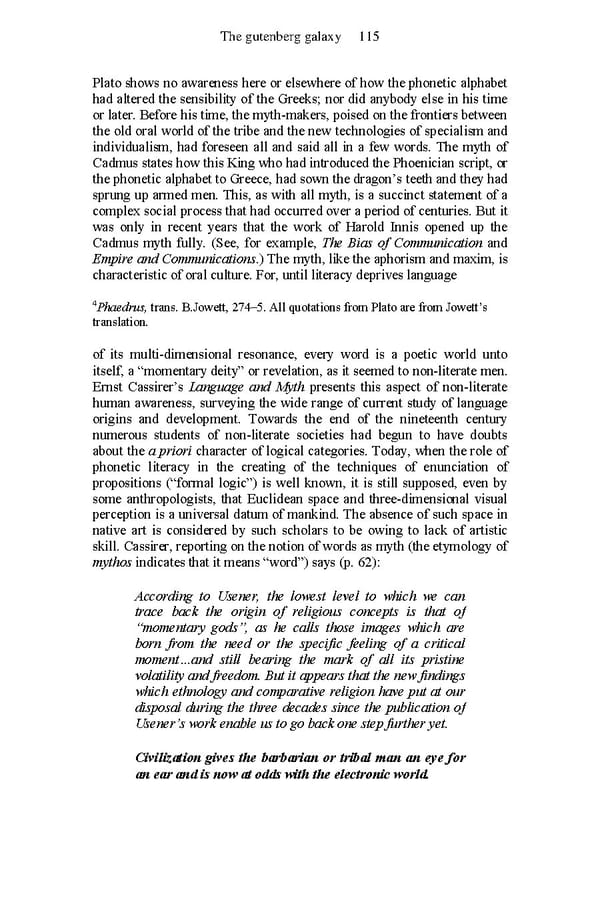The gutenberg galaxy 115 Plato shows no awareness here or elsewhere of how the phonetic alphabet had altered the sensibility of the Greeks; nor did anybody else in his time or later. Before his time, the myth-makers, poised on the frontiers between the old oral world of the tribe and the new technologies of specialism and individualism, had foreseen all and said all in a few words. The myth of Cadmus states how this King who had introduced the Phoenician script, or the phonetic alphabet to Greece, had sown the dragon’s teeth and they had sprung up armed men. This, as with all myth, is a succinct statement of a complex social process that had occurred over a period of centuries. But it was only in recent years that the work of Harold Innis opened up the Cadmus myth fully. (See, for example, The Bias of Communication and Empire and Communications.) The myth, like the aphorism and maxim, is characteristic of oral culture. For, until literacy deprives language 4 Phaedrus, trans. B.Jowett, 274–5. All quotations from Plato are from Jowett’s translation. of its multi-dimensional resonance, every word is a poetic world unto itself, a “momentary deity” or revelation, as it seemed to non-literate men. Ernst Cassirer’s Language and Myth presents this aspect of non-literate human awareness, surveying the wide range of current study of language origins and development. Towards the end of the nineteenth century numerous students of non-literate societies had begun to have doubts about the a priori character of logical categories. Today, when the role of phonetic literacy in the creating of the techniques of enunciation of propositions (“formal logic”) is well known, it is still supposed, even by some anthropologists, that Euclidean space and three-dimensional visual perception is a universal datum of mankind. The absence of such space in native art is considered by such scholars to be owing to lack of artistic skill. Cassirer, reporting on the notion of words as myth (the etymology of mythos indicates that it means “word”) says (p. 62): According to Usener, the lowest level to which we can trace back the origin of religious concepts is that of “momentary gods”, as he calls those images which are born from the need or the specific feeling of a critical moment…and still bearing the mark of all its pristine volatility and freedom. But it appears that the new findings which ethnology and comparative religion have put at our disposal during the three decades since the publication of Usener’s work enable us to go back one step further yet. Civilization gives the barbarian or tribal man an eye for an ear and is now at odds with the electronic world.
 Essential McLuhan Page 121 Page 123
Essential McLuhan Page 121 Page 123